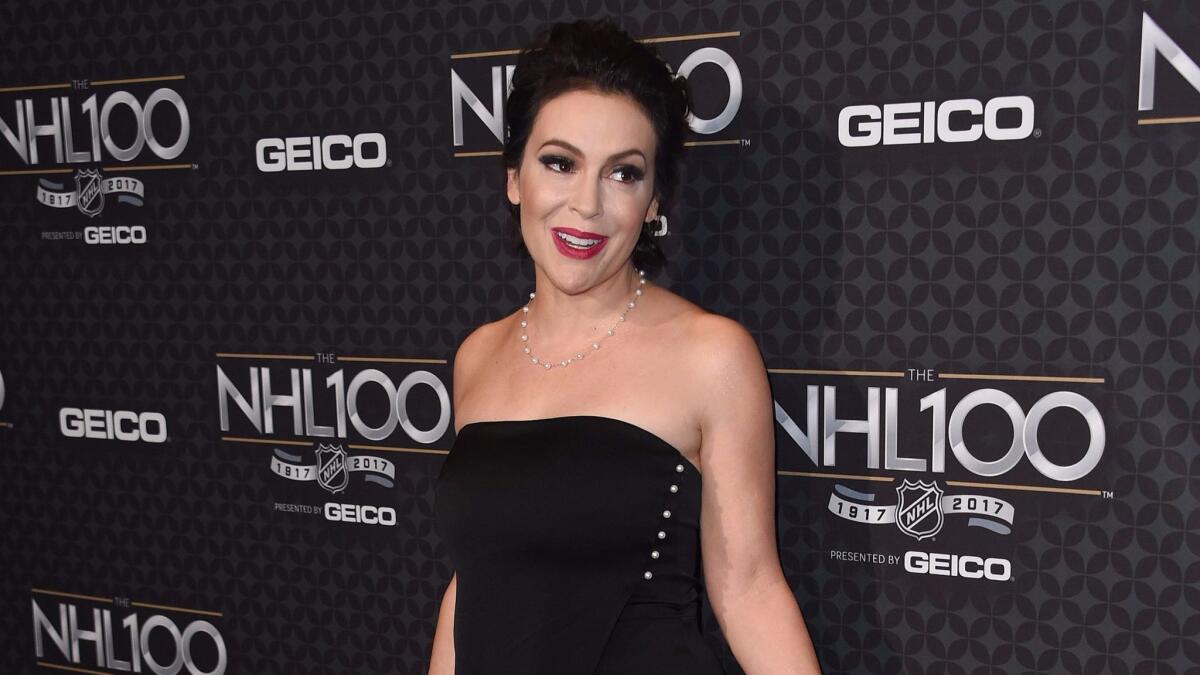A global primal scream: #MeToo (#YoTambien #QuellaVoltaChe #גםאנחנו أنا_كمان#)

- Share via
Reporting from Jerusalem — Social media around the world responded with something like a primal scream to American actress Alyssa Milano’s Twitter request that women tell their stories of sexual harassment or assault with the hashtag #MeToo.
Milano’s campaign grew out of accusations by actresses against movie producer Harvey Weinstein, but instantly touched a nerve among women in dozens of countries and all walks of life.
Nowhere was the reaction stronger than in Israel, where the country’s biggest newspaper, Yediot Aharonot, downplayed headlines about Iranian threats and police investigations of the prime minister and devoted nearly its entire front page to the Hebrew meme #גםאנחנו (#UsToo) on Wednesday.
Along with the hashtag, the newspaper ran photos with personal stories from six women, including former Minister of Education Limor Livnat, a onetime rival to Prime Minister Benjamin Netanyahu, who recounted an attempted rape by a “senior politician” she met while looking for work.
On Facebook, the model Maayan Keret, who walked the runway for Yves St. Laurent and Jean-Paul Gaultier, among others, posted: “I have stopped counting the number of times I was raped.”
Gila Gamliel, Israel’s minister for social equality, described “a formative experience” when, at age 19, she found herself on a crowded bus “and suddenly the disgusting feeling of an unknown hand touching my backside.”
In Italy, home to former Prime Minister Silvio Berlusconi’s bunga bunga sex parties, the hashtag became #QuellaVoltaChe (#TheTimeThat). France, which reacted with confused ambivalence to rape allegations against presidential aspirant Dominique Strauss-Kahn, saw social media flooded with #BalanceTonPorc (#DenounceYourPig).
Without using the hashtag, French President Emmanuel Macron announced he had started proceedings to strip Weinstein of his Legion of Honor award.
In the Spanish-speaking world #MeToo translated directly as #YoTambién.
A Mexican journalist for Buzzfeed, Mireya González, tweeted: “Every morning I’m accosted at least four times within 10 minutes of my house, and I’ve had it up to here. #YoTambién.”
In the Arabic-speaking world, where any mention of sexual harassment is still commonly considered taboo, two versions of #MeToo are competing, both of which translate as “me too” or “me also.”
Men and women have come forward to share an experience that seems, taboos notwithstanding, to be ubiquitous.
Rami Jarrah, a Syrian activist, tweeted: “Me too. Because almost [every woman] in my life & that I know has either been assaulted or raped, or even molested as a child. #MeToo.”
In Egypt, Mona Seif, an activist, posted that “I don’t know of any female friend of mine in Egypt who has not been a victim of sexual harassment, and definitely #MeToo. Sexual harassment and assaults in the streets are a daily part of any woman’s life here. We think about it, prepare for it--mentally and physically--every time we step out of the door.”
Egyptian chanteuse Jermeen Nasr tweeted: “Girls and women of Egypt face sexual harassment every day….They are forced to keep silent….no we won’t. #MeToo.”
In Egypt, reports of abuse and harassment against women run rampant. A 2013 United Nations study found that 99.3% of women interviewed reported having experienced some form of sexual harassment.
Hearing this, 23-year-old Gaia Ostrovsky, a recent Hebrew University of Jerusalem graduate, said: “It is something that happens daily. The other day I was walking through the central bus station and some guy called out ‘Slut!’ I wonder who the .7% is.”
Even in Iran, where the government has banned the use of Twitter and Facebook, citizens managed to circumvent censorship to share their experiences and discuss the issue under a Persian hashtag that translates as “#MeToo.”
“#MeToo I was 13 years old. I had nightmares for some time after that,” a tweeter using the name Vida wrote. “How insecure I became about everything. It was on the level of harassment but had a terrible impact.”
“Yes, #MeToo. But the person who did that to me is around here and is liking #MeToo tweets and retweeting them and utters kind things to those tweets,” an Iranian woman named Nahid tweeted.
In Afghanistan, Maryam Mehtar, who identifies herself as a freelance journalist, tweeted: “When I was a child, I had some experiences of sexual harassment which still bother me. #MeToo.”
The New York-based French videographer Sandra Muller, 46, who came up with #BalanceTonPorc, told the Agence France-Presse news agency that “the incredible proportions of the Weinstein affair shocked” her. The image that inspired the now-ubiquitous hashtag was a “huge picture of Weinstein in Le Parisien magazine that identified him as ‘the pig.’ It started as a joke,” she said.
Milano’s inspiration, it appears, came from Tarana Burke, an African American activist for equal rights who established the MeToo Movement 10 years ago. “It wasn’t built to be a viral campaign or a hashtag that is here today and forgotten tomorrow,” Burke told Ebony magazine. “It was a catch phrase to be used from survivor to survivor to let folks know that they were not alone and that a movement for radical healing was happening and possible.”
ALSO
Palestinian rivals Hamas and Fatah reach a preliminary deal on governing Gaza
Here’s a look at 26 newsmakers accused of sexual harassment, assault or related behavior
A trip through horror, confusion and contradictions in Syria
Special correspondent Tarnopolsky reported from Jerusalem and staff writer Etehad from Los Angeles.
More to Read
Sign up for Essential California
The most important California stories and recommendations in your inbox every morning.
You may occasionally receive promotional content from the Los Angeles Times.











